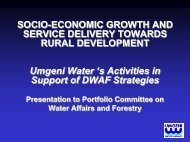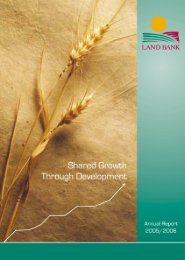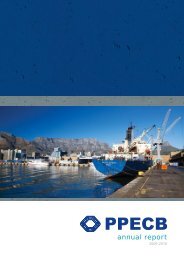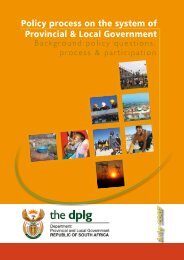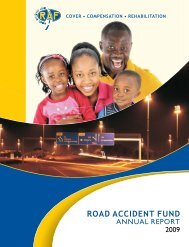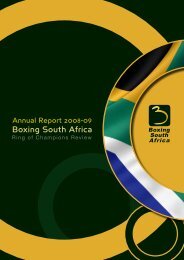Human Settlements Review - Parliamentary Monitoring Group
Human Settlements Review - Parliamentary Monitoring Group
Human Settlements Review - Parliamentary Monitoring Group
You also want an ePaper? Increase the reach of your titles
YUMPU automatically turns print PDFs into web optimized ePapers that Google loves.
<strong>Human</strong> <strong>Settlements</strong> <strong>Review</strong>, Volume 1, Number 1, 2010<br />
It is important to stress that current patterns<br />
of economic growth and genuine sustainability<br />
are wholly contradictory concepts - economic<br />
interests usually ride paramount. Further<br />
economic growth implies quantity while<br />
development is a critique and a search<br />
for quality. Sustainable development as<br />
conceived by economist by and large fails to<br />
consider any reduction of material standards<br />
of living and any attempt to slow down the<br />
accumulation dynamics. “In short alternatives<br />
to development are blackballed, alternatives<br />
within development are welcome” (Sachs<br />
1995, 436 as quoted in Selby, 2008). If we<br />
accept the finiteness of the planet – that the<br />
planet is not an inexhaustible cornucopia –<br />
and if we interpret “sustainable development”<br />
as “sustainable growth” then the terms<br />
becomes an oxymoron, a contradiction in<br />
terms. Sustained growth within a planet that<br />
is finite is not possible unless one limits the<br />
timeframe within which the growth intention<br />
applies and/or is selective about where the<br />
growth should happen. We cannot continue<br />
with just enriching the already rich; if only<br />
economic performance counts, trade-offs will<br />
continue!<br />
Within South Africa with Environmental<br />
Impact Assessment practice where different<br />
alternatives and no-go alternatives have to be<br />
explored it is not untypical to get the following<br />
decision: “ the no-go alternative could not<br />
be adopted as the developer would lose his<br />
opportunity for economic investment and<br />
resultant gain” Provincial MEC, 2005<br />
At a plenary address of the International<br />
Association for Impact Assessment conference<br />
in Calgary in 2008 Ian Lowe rattled the cage<br />
a bit and asked the audience how best to<br />
achieve ‘unsustainable development’<br />
He answered this question himself and said by<br />
pursuing:<br />
• Increased per capita consumption<br />
• Rapid depletion of non-renewable<br />
resources<br />
• Over use / extermination of renewables<br />
• Disrupt global climate change<br />
• Produce more waste<br />
• Widen inequalities<br />
• Embrace materialism<br />
• Trash our ‘adaptation insurance’…<br />
[biodiversity]<br />
• Encourage population growth<br />
Arguably this is exactly what we are doing<br />
and the trajectory we are on. We are living<br />
beyond the carrying capacity of the earth – the<br />
assumption of economic growth being able<br />
to continue forever or be somebody else’s<br />
problems is illogical and denialism. We’ve<br />
reached the limits of a ‘FULL EARTH’ – our<br />
economy is too big for our earth (Costanza et<br />
al., 2010).<br />
The rhetoric of sustainable development has<br />
thus been used by environmental organisations<br />
and global economies alike and the conflict<br />
between development and protection was<br />
neutralised – the euphemism reassured us<br />
that we can have our cake and eat it too.<br />
The key issue was how to get a share of the<br />
cake, not the limits to the size of the cake.<br />
While development is made “sustainable” –<br />
able to be continued – capitalist models of<br />
progress and resource exploitation were often<br />
challenged but not notably changed. There<br />
exist staggering statistics such as that the<br />
126



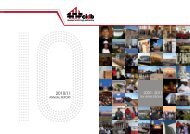
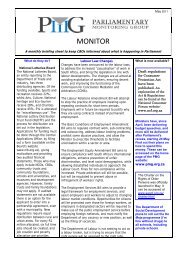
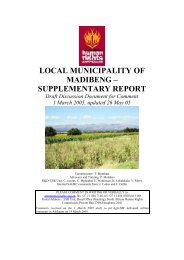
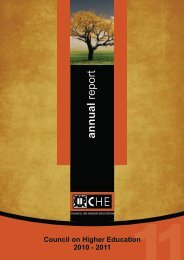
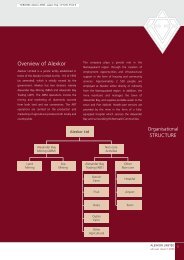
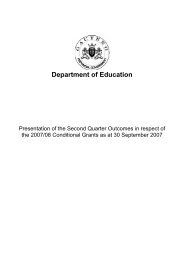
![National Research Foundation Annual Report 2008 / 2009 [Part 2]](https://img.yumpu.com/49774036/1/177x260/national-research-foundation-annual-report-2008-2009-part-2.jpg?quality=85)
